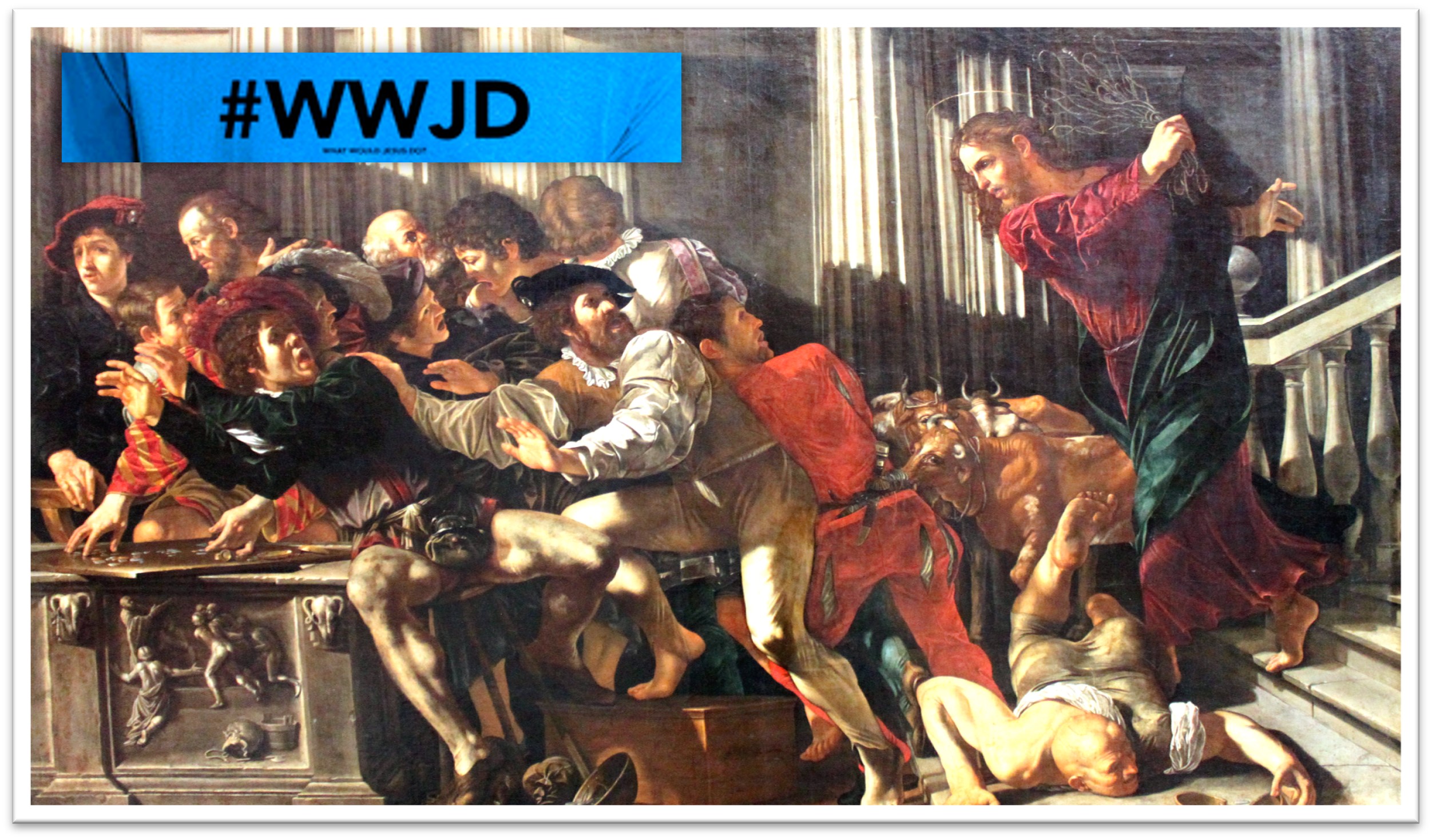"Religious People..."
29th August 2024
Yesterday we started out on a new blog series exploring my take on Susan Jones's recent article: 15 Things Non-Believers Want Religious People to Explain... Her article seeks to open a "respectful dialogue", and in that spirit I thought I'd take up the invitation and explore each of the 15 things in this new blog series.
Before we launch out properly - there's a few things which I think are worth saying. One is to do with the nature of explanations themselves which we'll come back to next week. The other, which I want to cover today, is about the terminology of "religious people" - as that will come up a few times along the journey.
-
A Non-religious Religious Leader?
Instinctively, I want to say that I am not a religious person.
I'm aware that that's probably a very confusing thing for someone like me, a Baptist minister, to say. And I get that.
Whenever I look through the list of occupations on a form, I find myself defined as a "minister of religion"...
When there's a joint ecumenical gathering (when different denominations meet and worship together) I often find myself allocated a seat "among the clergy"...
and there are aspects of the role which do, undeniably, take recognisably religious forms: marriages, funerals, infant dedications, baptisms, etc.
So perhaps I'm just fooling myself when I say that I'm "not a religious person"...
Now, you might be wondering what it is about the label that I'm struggling with. Is it a need to rebrand what I do in a less-traditional and more-trendy kind of way? Why take time making this point? What is it about the robes of religion that I'm reluctant to wear?
Depending on your starting point - you might be surprised to learn that Jesus clashed strongly with the
"religious-types" of His day.
There's an old
before-you-go-to-bed-type prayer that used to get taught to children that starts with the words:
"Gentle Jesus, Meak and Mild..." That image of
Gentle Jesus - a polite, mild- mannered man who wandered around the countryside smiling at people, full of lovely little children's stories and generally just being kind to those in need - seems to have endured into our culture today.
But what got Jesus killed on a cross was not the fact that he was a nice guy... the reality was that the religious viewed Him as a total troublemaker: a very real threat to their beloved traditions.

When I was a teenager, I remember being given a wristband with the acronym:
WWJD printed on it - and despite sometimes telling me friends that it stood for:
the Wacky World of Jonathan Davies... I knew it really stood for:
What Would Jesus Do? The idea being that you carried that question:
What Would Jesus Do? with you into the normal circumstances of your life, and tried to imitate Him today.
I was proudly wearing it in church one Sunday when someone was preaching on a passage from the Bible where Jesus is so enraged by market place that the Temple had become that He started flipping their tables over; sending their piles of money and record books all over the place... But He's done yet, He then grabs a whip and starts driving the money changers themselves out of the Temple's front door.

I sat listening this story - whilst wearing a wristband designed to encourage me to do
what Jesus would do... and it just made me smile. What would we do with someone who burst into our church and started throwing the chairs around for example? Could we really handle Jesus in our quiet and polite church?? (And if the answer is "no" - isn't that a bit of a problem?!)
Jesus was compelled to do something drastic about the sheer injustice of the the Temple system favouring the rich over the poor, and the ugly corruption that had been allowed to creep in to the leadership of the Temple.
Jesus publicly and passionately challenged the religious people of His day - and not in a polite
"perhaps we can meet to discuss my concerns" kind of way! He didn't send a strongly worded email, or vent His venom on His socials... He grabbed the corners of tables and sent them hurtling through the air...
in the Temple of all places!
Now considering these money-changers are there to prop up the Roman taxation system, it's not hard to imagine how that kind of thing would most definitely get you killed.
"Jesus was a difficult and uncooperative revolutionary who so threatened the established order of the day that there seemed to be no option but to have Him executed!"
ALISON MORGAN
Suddenly the Gentle-Jesus image doesn't seem to fit anymore.
And it did get Him killed.
But it got us so much more...
The Torn Curtain and the Death of a System
Three out of the four Gospel authors document in the Bible that among the extraordinary events occurring at Jesus' death was the tearing of the Temple veil, from top to bottom. This veil, a massive curtain measuring 60 feet in length, 30 feet in height, and 4 inches in thickness, served as a barrier separating the common worshippers from "The Most Holy Place," accessible only to the High Priest. It symbolized a distinct separation between the "holy" and the "unholy," the "spiritual elite" and the "great unwashed."
In fact the "Most Holy Place" was considered so Holy that the High Priest spent a year's preparation before they could enter it and offer sacrifices to make atonement on behalf of the people. A rope was tied around their waist so that if there was any sin in his life which caused them to die whilst performing this most holy service, the people could then drag their body out of there without having to enter through the curtain themselves!
Jesus often spoke of His death as a
sacrifice -
an offering - on behalf of people. By His one complete and perfect sacrifice, Christians believe that our wrongs can been atoned for and the way to come to God is now open for everyone - and not just the High Priest or the "holy"!
This leads New Testament Scholar N.T. Wright to state that:
"Jesus was inaugurating a way of life which had no further need of the Temple."
N.T. WRIGHT
In other words - from a Christian perspective, the death of Jesus is the death of religion. He has offered the final sacrifice- a complete and perfect offering on our behalf! He has fulfilled all the Old Testament Law! He has opened the way to the God He calls: Father!
Other authors, Alan Hirsch and Michael Frost write about this in their book
ReJesus – a Wild Messiah for a missional church... concluding that the early church wasn't just
non-religious, they were actually
anti-religious! With that understanding much of Paul's letters in the New Testament,
(and especially the anonymous letter to the Hebrews), start to make a lot more sense!
So how did we get from there to the very ruled-based, ritualistic, judgmental, religious Christianity we often see around us today?
In that same book, Alan and Michael describe a traceable process:
What happens in the beginning of a movement is that the people encounter the divine in a profound and revelatory way, but with successive generations this encounter tends to fade like a photocopy of a photocopy of a photocopy. What begins as a revolutionary, life-transforming, confrontation with Jesus eventually subsides into a codified religion and is subsequently incorporated into normal social life.
ALAN HIRSCH AND MICHAEL FROST
Which is why as Christians, (or "Followers of the Way" as we were originally called!) we must keep returning to Jesus to keep our faith authentic, renewed and healthy... and whenever and wherever our traditions collide with the truth of Jesus, then tradition must be flipped over like a table in the temple to allow the passion and justice of Jesus to flow!
Compare and Contrast
One final thought on why being a
"non-religious religious leader" matters so deeply to me: if you compare Jesus' message with the message of "religion" they are not just dissimilar... they are actually opposites!
A guy called Jefferson Bethke wrote a spoken-word piece called:
Why I Hate Religion But Love Jesus, and in it he writes:
Now back to the point, one thing is vital to mention:
How Jesus and religion are on opposite spectrums.
See, one’s the work of God, but one’s a man-made invention.
See, one is the cure, but the other’s the infection.
See, because religion says, “Do,” Jesus says, “Done.”
Religion says,”Slave,” Jesus says, “Son.”
Religion puts you in bondage, while Jesus sets you free.
Religion makes you blind, but Jesus makes you see.
JEFFERSON BETHKE
He ends with:
So for religion, no I hate it. In fact I literally resent it.
Because when Jesus said, “It is finished,” I believe He meant it.
JEFFERSON BETHKE
There's much more to be said about Jesus verses Religion, and we'll touch on more as this blog series unfolds, but let me end with this...
My suspicion is that, deep down, we all have a gnawing feeling that something is seriously wrong with us - or at very least that something inside of us is not being realised to it's fullest potential. Religious beliefs and practises can be an attempt to fix or fill that feeling, but I believe they are ultimately doomed to fail. But Jesus' message was that since no amount of spiritual striving or successes could build a ladder high enough to reach up to God, He (yes, God Himself) has come down to us.
Jesus' solution was not to start a new religion, but to open the way for a new relationship with God built on His grace. That's why it really matters to me that I'm not a religious person, I jumped off that ladder a long time ago, and found Jesus at the bottom of it with arms open wide waiting to catch me. And now, knowing Jesus personally, there is absolutely nothing that could convince me to go back.
-
Explaining explanations...
All of which has, so far, only been about
what I believe - and I have been promising, (and will be getting onto)
why I believe
what I believe... but before I do, there's just one thing I want to explore about the nature of "explanations"... but I've said more than enough for one blog - check back next week for more.